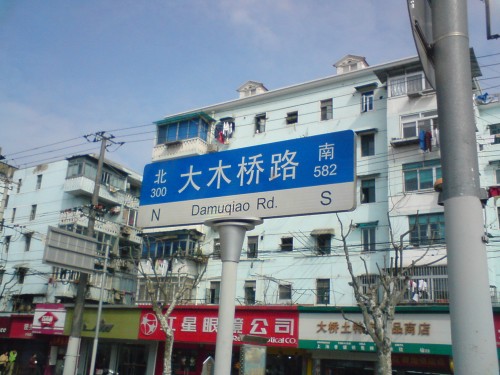Globalized City

If one looks around in Shanghai, one sees English translations on road signs and subway maps. I asked a local friend why this is so, and she said because Shanghai is a globalized city, and it needs to be ‘friendly’ for international visitors. She compares this to how China had been closed during the Manchu dynasty, which caused the backwardness and ignorance of worldly affairs for many centuries. My reaction to her was, but this is China, why do you have a foreign language on your signage? And if one thinks deeper into it, it becomes a really bad metaphor when a foreign language is giving you directions in your own backyard. But that metaphor is probably a really strong reflection on what’s going on in China right now, or at least the direction that they are headed towards. I had just arrived from New York and so I told my friend that there aren’t Chinese words on the street signage there, and what does that say, but I know for my friend and for most people, English is the de facto language for international relations, diplomacy and trade.
But is it really? Or is it a kind of exclusive club for English-speaking nations that China wants to be part of ? It almost seems that the Chinese language used to be the de facto language for many Asian countries such as Japan, Korea, Vietnam, etc. when China was still an empire. And as China’s power gradually weakened over the last 400 years, the Chinese language lost its place, just like how the French language did, although you can still seem remnants of it in all the various Asian cultures.
I guess the next thing to think about is whether the adoption of a foreign language in your country’s infrastructure helps or harms the country. My friend thinks that it is needed right now, as China is still growing and still ‘immature’, but I beg to differ and think that it belittles the dignity of this ancient civilization. The Chinese civilization is anything but immature. It’s problem is one of self-confidence, which stems from the humiliation of The Opium War, and China will never go far if it keeps looking up to the West, as much as it is growing right now. One can only grow so much from without, but true growth comes from within, and that will only happen when China breaks its shackles from Western dominance and starts to lead again.
The misconception that a lot of people have about Globalization is that it’s about making your city more internationally friendly. Sure it is, but it’s also heavily tilted towards Western culture and honestly the words ‘globalization’ and ‘westernization’ are sometimes interchangeable in my opinion. Some people might judge a city as ‘global’ when it has McDonald’s or Starbucks. Others might judge it by the tall skyscrapers that have replaced historical buildings. No, I am not against Western culture, and in fact I actually think there’s a lot to learn from it; but the bigger issue at hand is the self-cleansing process that China is undergoing which they call ‘modernization’ or ‘globalization’, an idea once again propelled by the humiliation from World War II and the Opium War.